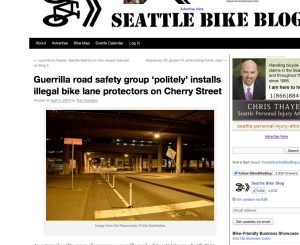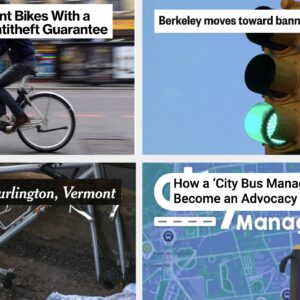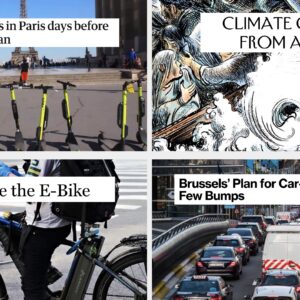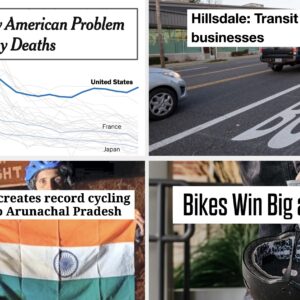
Here’s our recap of the biggest and best bike news we came across last week…
— Finally. It’s coming folks. Citibike in New York City. My friend Doug from Brooklyn Spoke shared photos and commentary on the new bikeshare stations and kiosks that were installed over the weekend.
— Also in NYC, the NYPD is demanding that a man who was struck while bicycling by an officer driving a police car pay for damages his bicycle caused to the police car.
— It was widely reported last week that religious police in Saudi Arabia lifted the ban on women riding bicycles. However as the news spread it became clear there were a lot of conditions and outlets like Al Jazeera took a more skeptical view of the news.
— Speaking of religion, an Australian man who follows the Sikh religion won in court after arguing he had a right to wear his turban and not a helmet as the law dictates.
— The next time your DOT tells you they need millions for new freeways or more lanes, just pass along the new video from Streetfilms: Americans are driving less:
STREET FACTS #2 – Americans Are Driving Less from Streetfilms on Vimeo.
— A police officer in West Vancouver (Canada) got caught on video punching a man suspected of running a red light and not wearing a helmet.
— Up in Seattle, police were able to track down a hit-and-run suspect who hit someone riding a bicycle while driving a Car2Go vehicle thanks to information stored in the vehicle’s computer database.
— And Seattle made even bigger news when a group of citizens (calling themselves Reasonably Polite Seattleites) took bike safety into their own hands and installed a guerrilla-style protected bike lane.
— Gnarlube, a seller of bicycle lube, found themselves in hot water after releasing an ad that is demeaning to women.
— I have no idea why, but several traffic fines in Washington D.C. are being lowered — including ones for speeding, failing to stop at red lights, and failing to yield to people walking.
— Meanwhile, a columnist for the Washingtonian says D.C. authorities need to get tougher on people who hit people on bikes while driving.
— You know those “bicycle highways” in Europe? Know there’s a push to build more of them even faster due to how much money they save governments in healthcare costs.
— How big of a disastrous boondoggle is the Columbia River Crossing (CRC) project? So big that even the venerable international magazine The Economist is making fun of it.
— Speaking of the CRC, Seattle Transit Blog did a three-part series examining how the project will impact Washington and why folks up north should care about it.
— If you are on the shorter side when it comes to height, Portland’s very own Elly Blue shared some tips on how to find the right bike.
— The 99% Invisible podcast published a fascinating historical look at the evolution of “jaywalking” and how cars came to dominate American roadways.
— A man riding his bike on one of Minneapolis’ famed greenways was hit with a molotov cocktail thrown by someone standing on an overpass above him.
— There’s been lots of buzz about a UCI rule forbidding pro mountain bikers from riding in unsanctioned (meaning local) races. Most pros are aghast at the rule saying it would hurt the grassroots. Here’s an opinion on the matter in Velonews from racer Jeremy Horgan-Kobelski.
Thanks for reading! If you come across something you think should be in next week’s Roundup, drop us a line via Twitter @bikeportland or email.







Thanks for reading.
BikePortland has served this community with independent community journalism since 2005. We rely on subscriptions from readers like you to survive. Your financial support is vital in keeping this valuable resource alive and well.
Please subscribe today to strengthen and expand our work.
“We’ll get to find out how badly Oregon wants this project,” says Ann Rivers, a Republican senator.
It is crazy to me that people in Washington still can’t seem to understand that people living in WA coming to Oregon are the main users of the CRC. I don’t understand why any Oregon lawmakers are even willing to pay for half of the freeway expansion.
“A police officer in West Vancouver (Canada) got caught on video punching a man suspected of running a red light and not wearing a helmet.”
I wonder why anybody would get arrested for traffic infractions…oh, yeah–he was riding a bike at the time. What would be a couple of tickets (usually) for a driver (failure to obey a traffic control device and failure to wear a seatbelt) somehow justifies getting arrested if you are on a bike? Is that because bicyclists are so much more of a menace when they run red lights? Or was it just a pretext to arrest this guy for something else that we don’t know about?
I can’t believe that the cop punched the guy in the face ON VIDEO and then claimed that he was resisting arrest WHEN YOU CAN SEE ON VIDEO THAT HE ISN’T.
“an ad that many people found demeaning”
let’s not take too many pages from the mainstream press, which finds it necessary to pretend there are two (and only two) legitimate perspectives on everything. the gnarlube ad was demeaning, period.
good point are. I edited that and will be more careful in the future.
These are the definitions I most easily found for the verb “demean”:
“to lower in character, status, or reputation”
“Cause a severe loss in the dignity of and respect for (someone or something)”
“to lower in dignity, honor, or standing”
Based on those definitions, I think humanity’s general perception could use a broad paradigm shift. Status, reputation, dignity, respect, honor, standing, etc are all abstractions. That is, they are matters of subjective perception. When I saw the ad in question, I didn’t think any less of any woman, and therefore the ad did not have the effect of “demeaning” women in my mind specifically. Ads don’t “demean”. Our thinking (whether it’s thinking that prompts ad making OR interpreting) is what “demeans” things.
advertising shapes thinking
The shape of thought is not directly or primarily influenced by external images, so your statement simplifies the process of interpretation by citing advertisement as doing something it does not do.
Wow. I just looked at the Gnar Lube link, and then another link to their facebook page. Disgusting.
Do the Darwin Awards have a ‘marketing’ category?
Jonathan, to clarify: the newly-enforced UCI rule isn’t just about pro mountain bikers participating in local racers. It applies to all license-holders and any race not sanctioned by USA Cycling — which includes OBRA races. So, enforcement of this rule means that, for example, CX pro Ryan Trebon, who lives in Bend, couldn’t race in the Cross Crusade. Here’s another article from VeloNews that talks a lot about how this could play out with OBRA in particular: http://velonews.competitor.com/2013/04/news/road/uci-usa-cycling-clarify-rule-barring-uci-licensed-riders-from-unsanctioned-events_280854
It also means that amateur racers who have a USAC license (in order to race in any WA state race, for example) cannot race in OBRA events without facing suspension, which affects a decent percentage of the local amateur racing crowd.
the Gnar Lube ad is just playing to their target market using the lowest common denominator in advertising. It is about as offensive as a Carl’s Jr. TV commercial.
I don’t think pointing out that someone’s sexuality might make the ad less appealing to them constitutes homophobia. It is a statement of fact. It is not demeaning homosexuality. Still it is not an appropriate or professional response.
The ad is sexist in a very blatant way. It verges on parody, but judging by the company’s response, I don’t think satire is within their intellectual capacity. It’s just bro’s appealing to bro’s.
If you don’t like it, click past it, and don’t buy it.
I’d disagree with you on the second point.
Here’s the text of the response: “if men think its in appropriate probably lying or gay.”
This reads as though the writer of the comment intended to insult anyone who thought the advertisement was inappropriate by calling them “gay” meaning “bad”.
It wouldn’t be hard to find a person (including a cisgendered straight man) who would think this ad is inappropriate. Chains have nothing to do with sex. Objectifying (a historically sexually objectified) group of people for sexuality to sell everyday non-sexual products is damaging and is in poor taste.
However, I do agree with you on your last point – I don’t like it, and will not be buying it.
I know that gay is often used in that context, but in this being being a gay male would likely mean that you do not find a sexual image a woman appealing.
For me stuff like this is so over-the-top let’s-ram-sex-down-their-throat that it just makes me roll my eyes. It is as much of an affront and an insult to (heterosexual) men as it is to women.
The sad truth is that this sort of advertising does work.
Chains have nothing to do with sex.
How about whips?
Just what this world needed: more arguments about chain lube.
I’ll bet it’s shitty lube.
Meanwhile, we’re W.I.N.N.I.N.G., Tulsa! Vote Tulsa at least TWICE! http://dc.streetsblog.org/2013/04/08/final-four-parking-madness-tulsa-vs-houston/
The story on the Seattle Car2Go hit-and-run has a very telling throw-away line at the end:
“According to Seattle records, the driver has a mostly clean ticket history in the city with only a couple of speeding infractions in recent years.”
That’s American car culture for you right there. The normalization and acceptance that suggests that receiving multiple speeding tickets isn’t something to have any shame about is a huge problem.
The Dutch are at least trying to do something</a? about it.